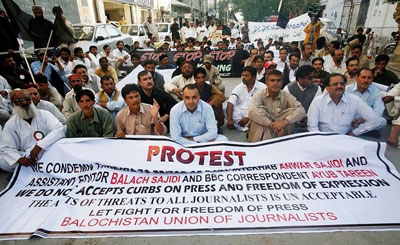Reporters in Pakistan’s conflict-stricken province of Baluchistan have been organizing to display their anger against the continued death threats they have been receiving from government secret services, religious militant groups, and armed nationalist organizations. Their most recent demonstration on October 1 was only one in a string of protests to confront the problem.
Baluchistan is a deadly province for correspondents, where state and non-state actors violently interfere in journalists’ professional work, with the aim of controlling how they and their enemies are portrayed in the media. On September 11, Javid Naseer Rind, the deputy editor of the Urdu-language Daily Tawar, was grabbed by intelligence agents and has not reappeared, his relatives say. Soon after Rind’s disappearance, the paper’s editor, Khadim Lehri, went into hiding after receiving threats on his life.
The men and their families are right to fear for their safety, At least three Daily Tawar reporters, Abdul Hameed Hayatan, Siddiq Eido, and Rehmatullah Shaheen, were killed last year. [CPJ is investigating these cases to determine whether the murders were related to journalism.]
The paper blames the Pakistani government, where they have found little sympathy for their situation. At a recent hearing, the Baluchistan High Court threatened to imprison journalists for six months if they publish the statements of militant organizations that have been banned because of their involvement in violence and terror. The court says the publication of the groups’ activities glorifies violence, and has little sympathy for the journalists’ plight.
“If you can’t face the pressure then stop publishing newspapers,” Chief Justice Qazi Faiz Essa told reporters at the hearing.
Journalists have not found understanding from the militant side. The Lashkar-e-Jhangvi (LeJ) is an Islamic extremist group that aims to eradicate the minority Shia sect or convert its followers to Sunni Islam. On September 20, the group killed around 30 Shia pilgrims in an attack on a passenger bus. The LeJ wants newspapers to publish its press releases word for word, local journalists say.
“The LeJ does not recognize the high court decree and forces reporters to violate the law,” said one senior journalist who requested anonymity for safety reasons.
Reporters who have spoken to LeJ representatives on the phone say the organization insists that it has a “religious responsibility” to warn reporters at least three times before killing them. “If reporters defy our warning for a third time then we naturally get the religious endorsement to kill them,” a journalist in Baluchistan’s capital city Quetta cited an LeJ spokesman as saying. A newspaper editor, when contacted by this writer, said journalists would land in trouble if they dared to omit from the militants’ press releases the derogatory language denouncing the government.
The threats are taken seriously. “It is scary how much these organizations already know about each reporter’s family, home address and travel routes. They say if they can kill top army officers, then journalists can’t escape either,” the editor said.
Ayub Tareen, a senior BBC journalist, was recently threatened by the Baluch Liberation Front, a separatist nationalist armed group, because of the latter’s complaint of receiving what the group called “insufficient coverage.”
“They rang me up and inquired why the BBC covered the activities of their rival group [Baluch Liberation United Front, which] they termed as a ‘fake’ organization. I said my job was not to judge which organization was fake or authentic. As a reporter, my responsibility is to find out which group claims responsibility for an important attack,” he told this writer. Since the warnings, Tareen has changed his daily routine and reduced his reporting. His colleagues offered to relocate him to a safer location, but he declined.
Caught between the government and the militants, reporters say they have found little sympathy from their editors either. With no control over their editors’ decisions on how to edit or where to place a story, they are at the receiving end of complaints from the factions they are covering in the field. Government intelligence agencies such as the Inter-Services Intelligence, religious extremists groups and nationalist groups quickly complain to the reporters if their activities are not covered. And with the complaints come more threats.
